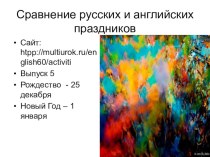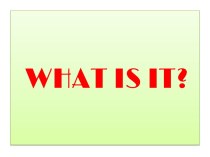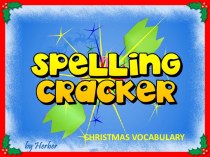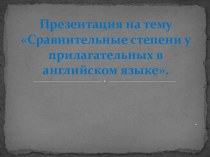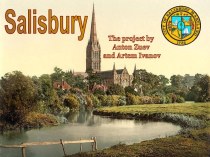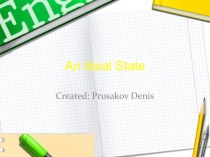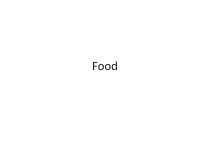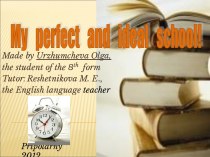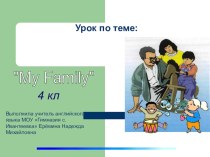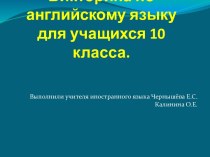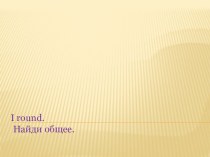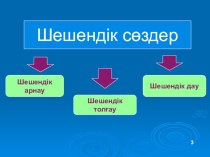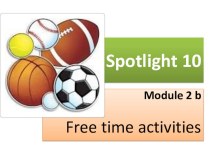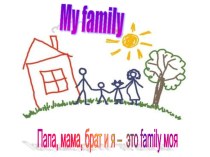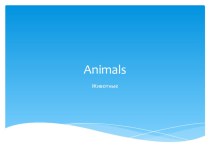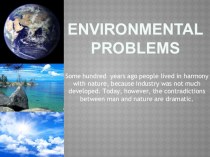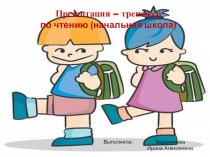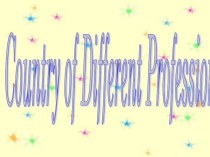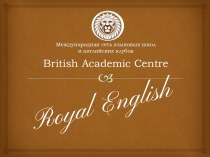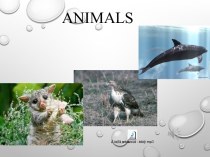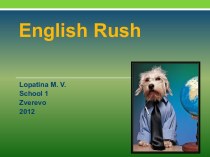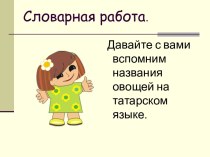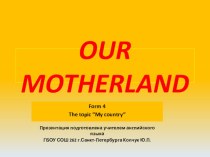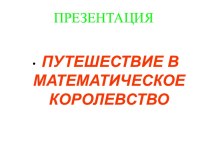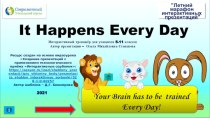- Главная
- Разное
- Бизнес и предпринимательство
- Образование
- Развлечения
- Государство
- Спорт
- Графика
- Культурология
- Еда и кулинария
- Лингвистика
- Религиоведение
- Черчение
- Физкультура
- ИЗО
- Психология
- Социология
- Английский язык
- Астрономия
- Алгебра
- Биология
- География
- Геометрия
- Детские презентации
- Информатика
- История
- Литература
- Маркетинг
- Математика
- Медицина
- Менеджмент
- Музыка
- МХК
- Немецкий язык
- ОБЖ
- Обществознание
- Окружающий мир
- Педагогика
- Русский язык
- Технология
- Физика
- Философия
- Химия
- Шаблоны, картинки для презентаций
- Экология
- Экономика
- Юриспруденция
Что такое findslide.org?
FindSlide.org - это сайт презентаций, докладов, шаблонов в формате PowerPoint.
Обратная связь
Email: Нажмите что бы посмотреть
Презентация на тему по английскому языку The differences between the British and Russian system of education
Содержание
- 2. What do you know about the education system in England?
- 3. What types of schools are there in England?SchoolsStatePrivatePublicComprehensiveGrammarBoarding
- 4. Match the school to its definition1.State school
- 5. Match the words and word combinations with their definition
- 6. TEXT 1In Britain most children attend __________
- 7. The Education System in Russia
- 8. Types
- 9. Complete the text
- 10. Word buildingCompare v – сравниватьComparison n- ?Similar
- 11. Are there any similarities and differences between
- 12. Complete the missing information-Children start school at
- 13. Compare the Russian and British systems of
- 14. Reported questions1. He asked me: “Have you
- 15. Grammar Card 2 Kate: “What types
- 16. Grammar Card 2 Stacy: “How many
- 17. Proverbs1.Practice makes perfect
- 18. Скачать презентацию
- 19. Похожие презентации
What do you know about the education system in England?
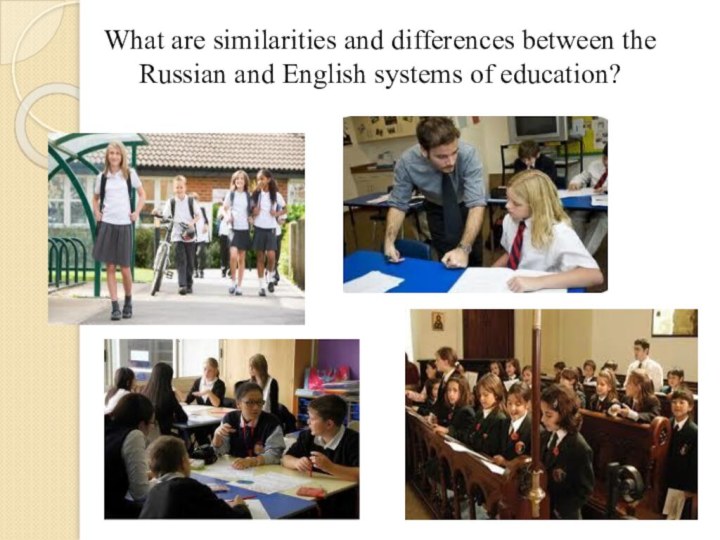

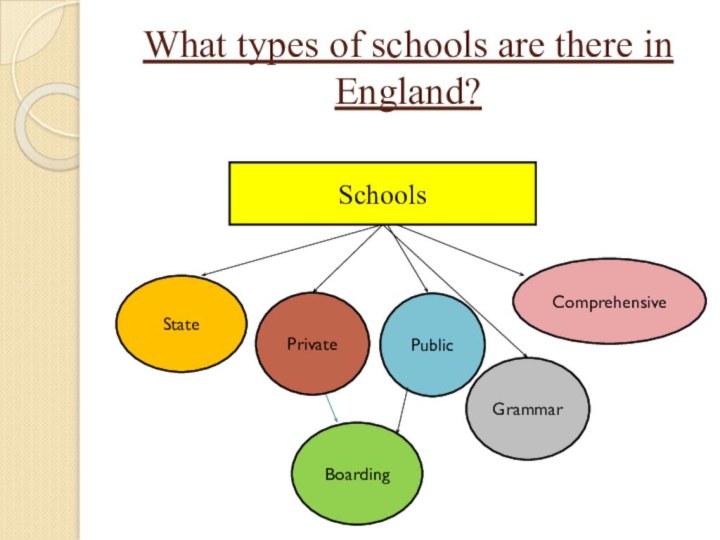


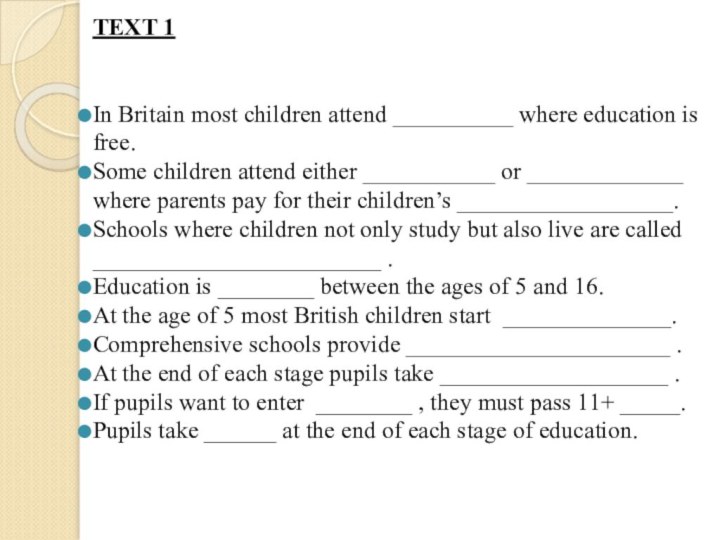

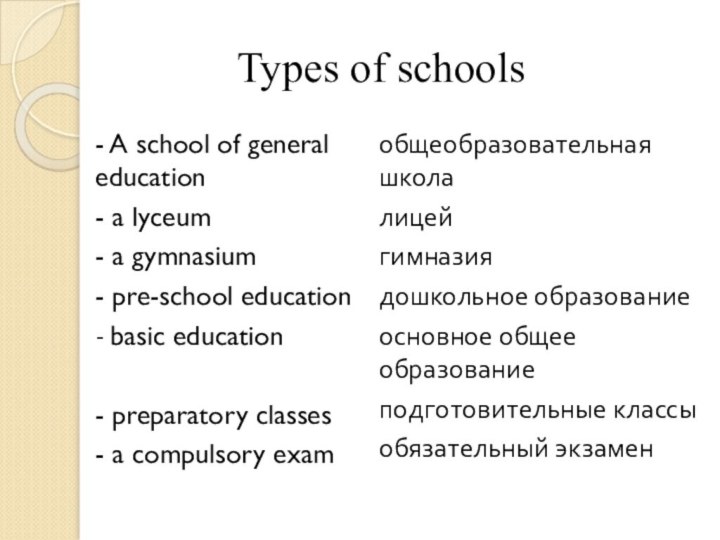
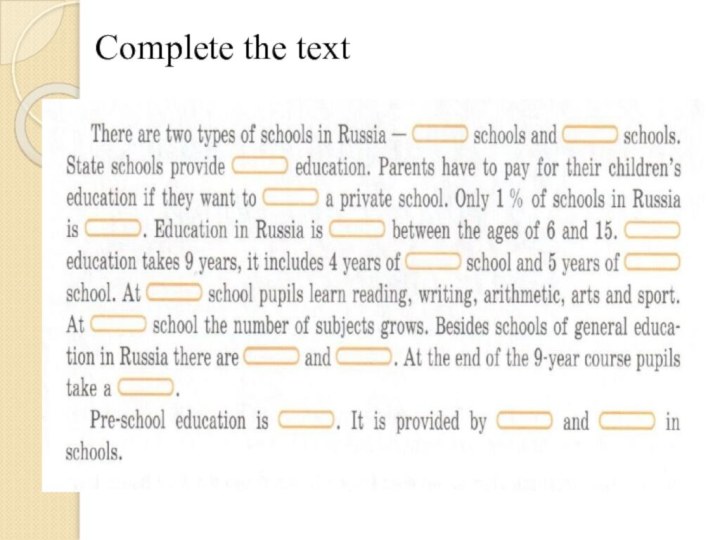





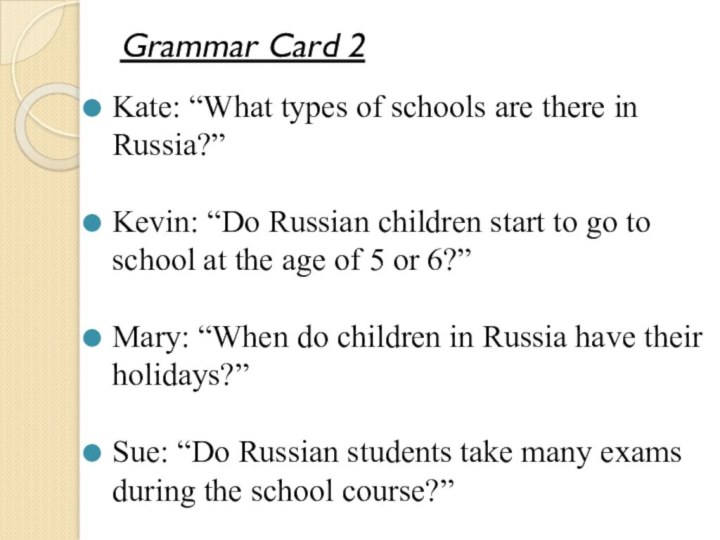

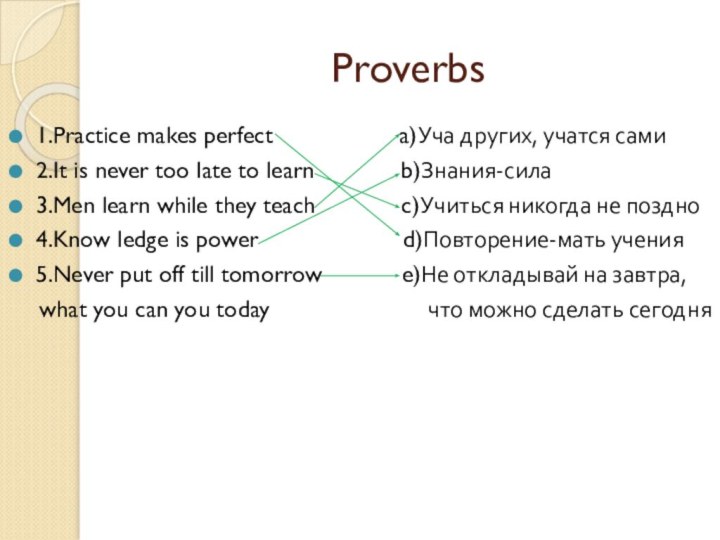
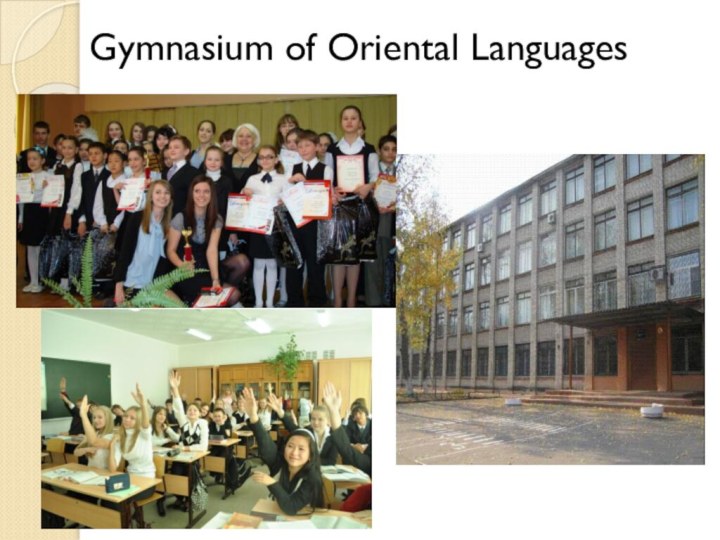
Слайд 3
What types of schools are there in England?
Schools
State
Private
Public
Comprehensive
Grammar
Boarding
Слайд 4
Match the school to its definition
1.State school
a)parents pay for
this school
2.Private school b)a school for children
from 11 of 16
3.Primary school c)children attend this
school for 6 years
4.Grammar school d)this school provide
free education
5.Boarding school e) children live and
study there
6.Comprehensive school f)you have to pass the exam
if you want to study at this school
Слайд 6
TEXT 1
In Britain most children attend __________ where
education is free.
Some children attend either ___________ or _____________
where parents pay for their children’s __________________.Schools where children not only study but also live are called ________________________ .
Education is ________ between the ages of 5 and 16.
At the age of 5 most British children start ______________.
Comprehensive schools provide ______________________ .
At the end of each stage pupils take ___________________ .
If pupils want to enter ________ , they must pass 11+ _____.
Pupils take ______ at the end of each stage of education.
Слайд 8 Types of
schools
- A school of general education
- a lyceum
- a
gymnasium- pre-school education
- basic education
- preparatory classes
- a compulsory exam
общеобразовательная школа
лицей
гимназия
дошкольное образование
основное общее образование
подготовительные классы
обязательный экзамен
Слайд 10
Word building
Compare v – сравнивать
Comparison n- ?
Similar a–
подобный, похожий, сходный
Similarity n - ?
Different a – непохожий,
отличныйTo differ v - ?
Prepare v – готовить
Preparation n - ?
Preparatory a - ?
Слайд 11 Are there any similarities and differences between the
systems of education in Russia and in Britain?
Both in
Britain and in Russia most children attend ________schools where the _________________ is free. Some children attend __________schools where parents must __________________ for their children’s education. But in Britain there are also _____________schools which are one of the most expensive and prestigious schools.Secondary education is ______________________ in both countries but in Britain children must __________________ school between the ______________ of 5 and 16 and in Russia between the ages of ___________ and _____________ . The period of primary ________ in Britain is ______________ years. In Russia it takes _____________ years. Just as in Britain the secondary school in _____________ takes five _______________.
Both in __________________ and in Russia students must ______________ exams. But in Britain they have _______________ exams at the end of each _______________ and in Russia they ______________ their compulsory exam at the end of Year __________ and the ______________ 11.
Слайд 12
Complete the missing information
-Children start school at the
age of 5.
-Children attend primary school between the ages
of 6 and 10.-There are no entrance examinations in comprehensive schools.
-Pupils take national exams at the end of each stage of education.
- If a pupil wants to study at a grammar school, he or she has to pass exams.
-Education is divided into 4 stages.
-Basic education takes 9 years.
Слайд 13
Compare the Russian and British systems of education
1.
In comparison with the British (Russian) system of education…….…
2.
Just as in Britain (in Russia) ……….3. Both in Britain and in Russia ………
4. In contrast to Britain, in Russia ………
Слайд 14
Reported questions
1. He asked me: “Have you finished
the report in History?”
He wanted to know if I
had finished the report in History.2. Sam asked: “Where will you spend your summer holidays?”
Sam was interested where I would spend my summer holidays.
3. Kate asked Sue: “ May I take your player?”
Kate asked Sue whether she might take her player.
Слайд 15
Grammar Card 2
Kate: “What types of schools are
there in Russia?”
Kevin: “Do Russian children start to go
to school at the age of 5 or 6?”Mary: “When do children in Russia have their holidays?”
Sue: “Do Russian students take many exams during the school course?”
Слайд 16
Grammar Card 2
Stacy: “How many terms are there
in Russian school year?
Alex: “What subjects do children learn
at primary school in Russia?”Nancy: “Does the number of subjects grow in secondary school in Russia?”
Max: “When do Russian students leave school?”
Слайд 17
Proverbs
1.Practice makes perfect
a)Уча других, учатся сами
2.It is
never too late to learn b)Знания-сила3.Men learn while they teach c)Учиться никогда не поздно
4.Know ledge is power d)Повторение-мать учения
5.Never put off till tomorrow e)Не откладывай на завтра,
what you can you today что можно сделать сегодня
